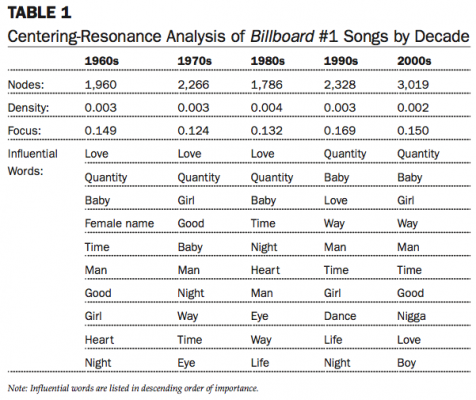“I don’t listen to the words.” So goes the refrain of people who are accused of enjoying pop music with vapid lyrics or songs with objectionable content. (“Blurred Lines,” anyone?)
It turns out, though, that lyrics are a significant predictor of a song’s commercial success. A new analysis by researchers at North Carolina State University reveals the top 12 most common themes based on the lyrics of No. 1 songs on Billboard’s Hot 100.
Unsurprisingly, the most popular themes are largely emotional in nature and tend to reflect the cultural influences of the time. The most consistently popular theme is “Breakup,” though there are spikes of popularity in each decade:
- 1960s: Nostalgia, Pain, Rebellion
- 1970s: Nostalgia, Rebellion, Jaded
- 1980s: Loss, Aspiration, Confusion
- 1990s: Loss, Inspiration, Escapism
- 2000s: Inspiration, Pain, Desperation
So why does it all matter, beyond a reminder that music can be quite melancholy? The study, slated for the June 2014 issue of Journal of Advertising Research, also shows the use of popular themes during certain decades can predict whether or not a song hits the Billboard Hot 100 at all.
The analysis shows that the presence of the top seven most common themes in a song’s lyrics could predict with a 73.4 percent accuracy whether a song would make the Hot 100 list.
“A lot of advertising research on how music impacts advertising is on tunes and jingles,” says lead author David H. Henard. “What hasn’t been examined is whether the lyrics play a role.”
Neuroscience research has shown that individuals process lyrics and tunes independently while listening to songs, he says, so the researchers chose to look at lyrics independently of tunes.
In an effort to control for music style and genre, which presumably are consistent within an artist’s catalog, Henard and his colleague Christian L. Rossetti focused on the top two artists in each decade from 1950 to 2009. The analysis shows that the presence of the top seven most common themes in a song’s lyrics could predict with a 73.4 percent accuracy whether a song would make the Hot 100 list. (Those themes are loss, desire, aspiration, breakup, pain, inspiration, and nostalgia.)
Henard said it’s the first time that lyrical themes in popular music have been shown to affect a song’s commercial success.
The study has huge implications for advertisers and marketers, Henard adds: “Music is something people have related to over the decades, so can we put out a message that will resonate with people? Will it go viral and be shared across social networks?”
While the current study doesn’t examine the primary themes of the 2010s, Henard says it’s just a matter of time before somebody conducts the analysis—most likely a company looking to capitalize on thematic engagement with their marketing.
The study has even more obvious implications for the hordes of songwriters who are trying to come up with Rihanna’s next song. Just take a look at 2014’s No. 1 singles—there’s plenty of emotional fodder there to fuel a new pop hit.

The most influential words (not themes) for Hot 100 No. 1 singles per decade. (Source: Journal of Advertising Research)




